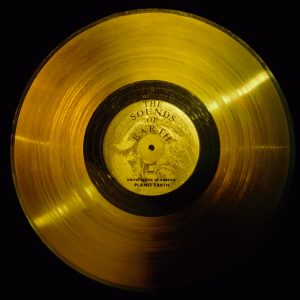I had to make some strict decisions in order to curate the Golden Record down to 10 songs. At first, I wanted to show an evolution of music, progressing from the more traditional tones to Rock. However, I quickly realized that doing that made most of my tracks originate in the West. I changed tactics and instead made my criteria focus on global and temporal diversity, and the human voice. I could not find a playable version of the Pygmy girls’ initiation song, but I chose to include it over the percussion music from Senegal as it seemed likely to include vocals (which the latter lacks).
The songs I chose, in the order I imagine them being played, were:
- Peru, wedding song, recorded by John Cohen. 0:38
- Zaire, Pygmy girls’ initiation song, recorded by Colin Turnbull. 0:56
- Australia, Aborigine songs, “Morning Star” and “Devil Bird,” recorded by Sandra LeBrun Holmes. 1:26
- Navajo Indians, Night Chant, recorded by Willard Rhodes. 0:57
- Georgian S.S.R., chorus, “Tchakrulo,” collected by Radio Moscow. 2:18
- Java, court gamelan, “Kinds of Flowers,” recorded by Robert Brown. 4:43
- Mozart, The Magic Flute, Queen of the Night aria, no. 14. Edda Moser, soprano. Bavarian State Opera, Munich, Wolfgang Sawallisch, conductor. 2:55
- “Dark Was the Night,” written and performed by Blind Willie Johnson. 3:15
- Mexico, “El Cascabel,” performed by Lorenzo Barcelata and the Mariachi México. 3:14
- India, raga, “Jaat Kahan Ho,” sung by Surshri Kesar Bai Kerkar. 3:30
The one thing I regret about this criteria is that I could not include Azerbaijan’s bagpipes along with Jaat Kahan Ho. This pairing is pure geekery, stemming from my love of Battlestar Galactica (2004-2009), a TV series about humanity wandering the cosmos in search of a new home. The composer, Bear McCreary (whom you may also have heard on Outlander and The Walking Dead), made the iconic soundtrack by merging bagpipes with ethic vocals. My geekery did have some satisfaction, though, from including “Dark Was the Night”. Its lonesome warbling is reminiscent of the music used in videogames like the Fallout series and Cargo Commander. These games star humans wandering… to what end, that’s up to the player to decide.

Hi Laura,
I find it interesting that you initially thought of a timeline for music. My own process was to eliminate first the overabundance of Euro-Western music which seemed to be overrepresented. Do you think this is because of the era the record was created? I am impressed with the way you attach meaning via your connections to your “geekery” and other media (tv series, and video games). I wonder what aliens would think of these shows, if they have eyes or ears or are able to sense audio and visual stimuli such as this. Did you include any songs you disliked? because of their global representation?
Hi Rebecca! I noticed the extra Euro-Western representation too (it comes up in our network— they seem to lump together on one side of the map). It may have had something to do with the era, if not the lack of recordings than perhaps the lack of access to them? Now we can just pop on YouTube and hear music from all over the world, but (I imagine) in the 70s you would have had to go to a library or record store, with the hopes there was a variety of vinyl in stock. The baroque classics would have been easy to come by!
It would be curious to see if an alien (who could watch/listen) would make out of Battlestar Gallatica! I wonder, assuming they were organic beings, if they would empathize with the humans losing their homeworlds to the cylons (which are like robots).
I didn’t include any songs I disliked, though I’m not partial to “Kinds of Flowers”. I was glad my criteria didn’t include Rite of Spring! That one sent my nerves on edge. I think it was giving me flashbacks to this terrifying scene from Fantasia: (https://youtu.be/G3VqcTDf6l4)
Hi Laura, were you able to eventually find a version of the Pygmy Girls initiation song? If not, here’s a YouTube link (https://youtu.be/c4xBM2QbTqk). I really liked your links to some modern pop culture/ geek culture references to these tracks, thank you for enlightening me. 🙂
Hi Carla! I hadn’t found it yet, so thank you for the link! It’s nice to hear that I was right in guessing that it would have vocals (would have been a tad embarrassing, otherwise).